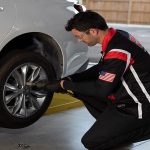Sound deadening refers to the process of reducing unwanted noise and vibrations within a vehicle’s interior, particularly from external sources. When it comes to car doors, sound deadening is crucial for creating a more comfortable, quieter ride. Road noise, engine sounds, and vibrations from external sources can all enter the cabin through the doors, leading to a noisy driving experience. To combat this, automotive shops install sound-deadening materials in the doors, which helps to absorb and block these noises, improving the overall acoustics of the vehicle.
Types of Sound Deadening Materials
Various materials can be used to soundproof car doors. The most common include foam, rubber, butyl-based mats, and fiberglass. These materials are designed to be lightweight yet effective at dampening sound. Butyl rubber mats, for example, are often used because they are dense and flexible, providing excellent sound absorption. Foam sheets are also commonly installed to reduce vibrations, while fiberglass batting can add an extra layer of insulation. Each material has its own strengths, and technicians typically choose the most appropriate option based on the vehicle’s needs and the desired level of noise reduction. Choosing the Auto Repair in Kelowna, BC based service would be essential here.
How Sound Deadening Is Installed
Installing sound deadening materials in car doors involves a few key steps. First, the door panel is carefully removed, and any existing insulation or soundproofing material is checked or replaced if necessary. The door’s metal surface is then cleaned to ensure proper adhesion of the new sound-deadening materials. Sheets of soundproofing material are cut to fit the door’s surface and adhered directly to the metal. In some cases, additional layers may be added for improved performance. The installation process also involves sealing any gaps or cracks in the door’s structure, which helps to further prevent noise infiltration.
Benefits of Sound Deadening in Car Doors
The most obvious benefit of sound deadening is a quieter cabin. By reducing road noise, engine sounds, and external vibrations, passengers can enjoy a more peaceful and enjoyable ride. Additionally, soundproofing can improve the overall driving experience by enhancing the clarity of the vehicle’s audio system. Reduced vibrations can also protect the car’s components from wear and tear. Furthermore, sound-deadening materials help to improve climate control efficiency by reducing the amount of air leakage, which can enhance energy efficiency in some vehicles.
Upgrading or Replacing Sound Deadening Materials
Over time, the sound-deadening materials in car doors can degrade, losing their effectiveness. Factors like heat, moisture, and wear can cause the materials to break down. When this happens, it may be necessary to replace or upgrade the insulation to maintain a quiet ride. Professional shops can inspect the soundproofing materials during regular vehicle maintenance and recommend replacement when needed. Upgrading to higher-quality materials or adding extra layers of insulation can also improve soundproofing performance, especially in high-end vehicles or for those seeking a premium driving experience.










